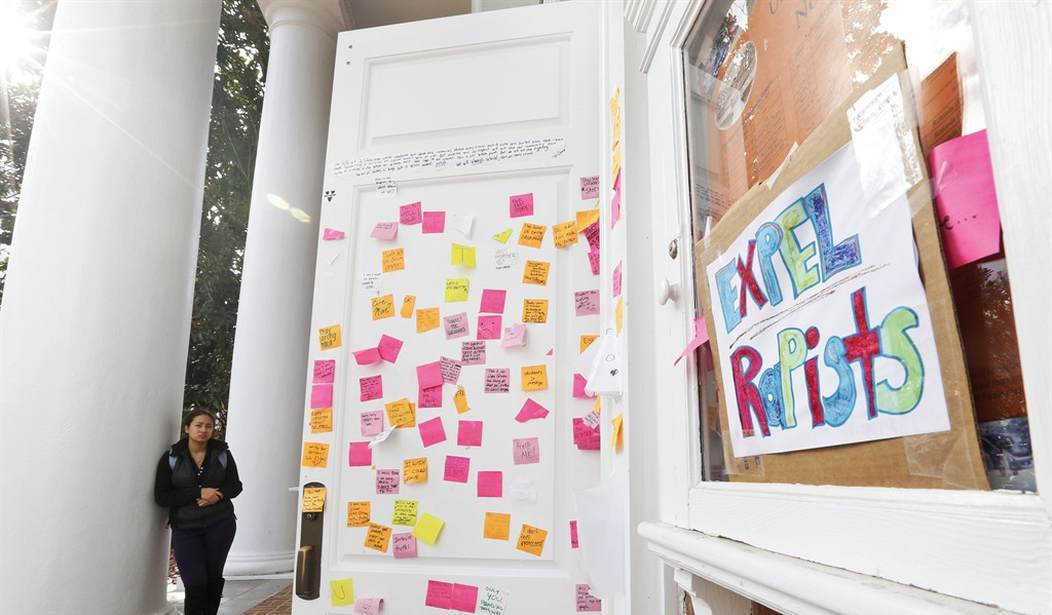The Atlantic has published the first part of a three-part series on the topic of campus sexual assault. Part one is focused on what the magazine calls recent and “problematic” changes to how campus sexual assault is handled. These changes began in 2011 at the behest of the Obama administration:
On april 4, 2011, the country’s more than 4,600 institutions of higher education received an unexpected letter from the Obama administration’s Department of Education. It began with the friendly salutation “Dear Colleague,” but its contents were pointed and prescriptive. The letter, and other guidance that followed, laid out a series of steps that all schools would be required to take to correct what the administration described as a collective failure to address sexual assault. Its arrival signaled the start of a campaign to eliminate what Vice President Joe Biden called an epidemic of sexual violence on campus.
The most significant requirement in the Dear Colleague letter was the adoption, by all colleges, in all adjudications involving allegations of sexual misconduct, of the lowest possible burden of proof, a “preponderance of evidence”—often described as just over a 50 percent likelihood of guilt. (Many universities were already using this standard, but others favored a “clear and convincing evidence” standard, requiring roughly a 75 percent likelihood of guilt. Criminal courts require proof “beyond a reasonable doubt,” the highest legal standard for finding guilt.)
Severe restrictions were placed on the ability of the accused to question the account of the accuser in order to prevent intimidation or trauma. Eventually the administration praised a “single investigator” model, whereby the school appoints a staff member to act as detective, prosecutor, judge, and jury. The letter defined sexual violence requiring university investigation broadly to include “rape, sexual assault, sexual battery, and sexual coercion,” with no definitions provided. It also characterized sexually harassing behavior as “any unwelcome conduct of a sexual nature,” including remarks…
In total, the procedures laid out by the letter and subsequent directives triggered the creation of a parallel justice system for sexual assault, all under the aegis of Title IX, the 1972 federal law that prohibits discrimination in educational opportunities on the basis of sex.
The article goes on to note that while initial letters referred to the “complainant” and “alleged perpetrator” later letters used the terms “victims” and “perpetrators.” And that shift in tone seems to track a shift in the due process rights for those accused of sexual assault on campus:
Even in civil court cases, defendants have myriad protections not typically found in Title IX proceedings, such as receipt of a specific, written complaint; clear rules of evidence; knowledge of the testimony of adverse witnesses; and the rights to discovery, cross-examination, and the calling of expert witnesses. The absence of options and protections such as discovery and cross-examination sometimes works against complainants, too—it’s a bad system. But especially in a context where the standard for finding guilt is so low, it is particularly unjust to the accused. The 2011 “Dear Colleague” letter said that the basic right to question one’s accuser should be severely limited.
The result of all of this is dozens of male students being treated badly by campus administrators and deciding to take their schools (or former schools) to court. At least 170 such lawsuits have been filed in the past few years.
The Atlantic piece, all of which is worth reading, concludes that while campus assault is real and sometimes victims don’t get the justice they deserved, “we have arrived at the point at which schools investigate, adjudicate, and punish the kind of murky, ambiguous sexual encounters that trained law-enforcement officials are unable to sort out.”
Courts are the appropriate place to handle allegations of serious crimes. If schools are going to run a parallel judicial system they need to raise the standard of evidence and make sure the rights of the accused are protected as well as they would be in civil court. That’s clearly not happening at many schools right now. I’m looking forward to part 2 of this series at the Atlantic.








Join the conversation as a VIP Member